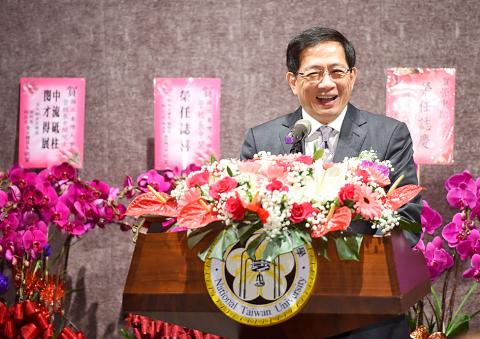National Taiwan University (NTU) professor Kuan Chung-ming (管中閔) took office as the university’s president at a ceremony yesterday amid lingering concerns over his controversial election.
Kuan thanked faculty, students and others for “supporting university autonomy” and “making the inauguration ceremony possible,” but did not comment on the controversy that delayed his inauguration for nearly a year.
While many people would think the position represents the peak of his career, he considered it an “opportunity to repay my debt to NTU,” Kuan said.

Photo: Liu Hsin-de, Taipei Times
Reiterating his vision for the university, he said that his priorities are enhancing its global competitiveness and promoting innovation, adding that he would do his best to collaborate with faculty and students to build “a brighter future” for the university.
Kuan was on Jan. 5 last year elected NTU president and was originally scheduled to take office the next month, but the Ministry of Education in April refused to appoint him, citing an alleged conflict of interest, as Kuan was an independent director on Taiwan Mobile’s board and company vice president Richard Tsai (蔡明興) sat on the university’s election committee.
It also found that Kuan had been on the company’s board and a member of its salary committee before the university approved his application to take up the positions.
The ministry ordered a new election, but the university refused to comply, saying that the order lacked legal basis.
On Dec. 24, then-minister of education Yeh Jiunn-rong (葉俊榮), who took office in July last year after two education ministers stepped down over the controversy, approved Kuan’s appointment, but requested that the university submit within three months a review of the controversies and propose solutions.
“With regard to some issues that arose during the presidential election, we hope the university would be open to different opinions and make improvements,” said Deputy Minister of Education Lin Teng-chiao (林騰蛟), who presided over the ceremony.
He also expressed the hope that as president, Kuan would work on communicating with faculty and students with different opinions and clarify public concerns in a timely manner.
The ceremony was attended by hundreds of people, including faculty, students, alumni and journalists, who filled the venue about an hour before the ceremony began.
About 200 police officers were deployed to maintain order, but the only protester was a professor who shouted “shame“ and gave a thumb-down sign when Kuan appeared on stage.
Although Kuan has been formally sworn in, his presidency remains uncertain due to a number of factors.
NTU professor Wu Ruey-beei (吳瑞北), who ran for president alongside Kuan, in September filed an administrative lawsuit against the ministry and NTU, requesting that the university repeat the election as there had been a potential conflict of interest in the election process.
The first court hearing is scheduled for Jan. 29.
Wu on Monday also appealed a Taipei High Administrative Court ruling that Kuan’s inauguration should not be postponed until the lawsuit reached a conclusion.
Kuan is under investigation for allegedly illegally working part-time for a magazine while serving as a minister without portfolio. If found guilty, he could be impeached by the Control Yuan.
Additional reporting by Wu Po-hsuan

Alain Robert, known as the "French Spider-Man," praised Alex Honnold as exceptionally well-prepared after the US climber completed a free solo ascent of Taipei 101 yesterday. Robert said Honnold's ascent of the 508m-tall skyscraper in just more than one-and-a-half hours without using safety ropes or equipment was a remarkable achievement. "This is my life," he said in an interview conducted in French, adding that he liked the feeling of being "on the edge of danger." The 63-year-old Frenchman climbed Taipei 101 using ropes in December 2004, taking about four hours to reach the top. On a one-to-10 scale of difficulty, Robert said Taipei 101

Nipah virus infection is to be officially listed as a category 5 notifiable infectious disease in Taiwan in March, while clinical treatment guidelines are being formulated, the Centers for Disease Control (CDC) said yesterday. With Nipah infections being reported in other countries and considering its relatively high fatality rate, the centers on Jan. 16 announced that it would be listed as a notifiable infectious disease to bolster the nation’s systematic early warning system and increase public awareness, the CDC said. Bangladesh reported four fatal cases last year in separate districts, with three linked to raw date palm sap consumption, CDC Epidemic Intelligence

Two Taiwanese prosecutors were questioned by Chinese security personnel at their hotel during a trip to China’s Henan Province this month, the Mainland Affairs Council (MAC) said yesterday. The officers had personal information on the prosecutors, including “when they were assigned to their posts, their work locations and job titles,” MAC Deputy Minister and spokesman Liang Wen-chieh (梁文傑) said. On top of asking about their agencies and positions, the officers also questioned the prosecutors about the Cross-Strait Joint Crime-Fighting and Judicial Mutual Assistance Agreement, a pact that serves as the framework for Taiwan-China cooperation on combating crime and providing judicial assistance, Liang

US climber Alex Honnold left Taiwan this morning a day after completing a free-solo ascent of Taipei 101, a feat that drew cheers from onlookers and gained widespread international attention. Honnold yesterday scaled the 101-story skyscraper without a rope or safety harness. The climb — the highest urban free-solo ascent ever attempted — took just more than 90 minutes and was streamed live on Netflix. It was covered by major international news outlets including CNN, the New York Times, the Guardian and the Wall Street Journal. As Honnold prepared to leave Taiwan today, he attracted a crowd when he and his wife, Sanni,